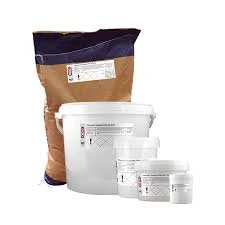
Sodium Stearoyl Lactylate as an Effective Emulsifier in Food Products
Exploring Sodium Stearoyl Lactylate A Versatile Emulsifier in Food and Beyond
Sodium stearoyl lactylate (SSL) is an emulsifier derived from the combination of stearic acid and lactic acid, primarily used in the food industry due to its unique properties. This particular emulsifier plays a crucial role in enhancing the texture, stability, and overall quality of a variety of products. With a growing focus on food science and technology, SSL has garnered attention not only for its functionalities but also for its potential health benefits.
Functionality and Uses in Food Products
As an emulsifier, SSL facilitates the mixing of oil and water, which is critical in numerous food formulations. It serves to stabilize emulsions, thereby preventing separation and improving product uniformity. In baked goods, SSL contributes to dough conditioning, enhancing gas retention and texture. This results in lighter, more uniformly baked products, a key factor in the competitive food market.
SSL is also utilized in dairy products, where it serves to improve the stability of emulsions and enhance mouthfeel. Its ability to interact with proteins and fats allows it to improve consistency in various applications, from ice creams to cheese sauces. Moreover, it has found use in processed meats, contributing to texture and moisture retention.
Health and Safety Considerations
One of the appealing aspects of sodium stearoyl lactylate is its Generally Recognized As Safe (GRAS) status as designated by the U.S. Food and Drug Administration (FDA). As a byproduct of naturally occurring substances, SSL is usually well-tolerated and poses minimal risk when consumed in standard dietary amounts. However, as with any food additive, individual sensitivities may arise, necessitating informed labeling and consumer awareness.
In recent years, there has been a growing trend toward cleaner labels in the food industry, leading manufacturers to seek out more natural or minimally processed ingredients. Sodium stearoyl lactylate's origin from naturally sourced components positions it well in this evolving landscape. Many consumers are looking for transparency regarding the ingredients in their foods, and SSL can meet some of those needs by serving as a non-synthetic emulsifier.
sodium stearoyl lactylate emulsifier

Applications Beyond Food
While SSL is most commonly recognized for its role in the food industry, its versatility allows for applications in other sectors. It can be found in cosmetics and personal care products as a stabilizer and emulsifier. In pharmaceuticals, SSL acts as a surfactant, improving solubility and bioavailability of certain formulations.
Its usage in these non-food applications highlights the significance of sodium stearoyl lactylate in broader industrial contexts, showcasing its multifunctionality across various fields
.Conclusion
In summary, sodium stearoyl lactylate is a remarkable emulsifier that plays an essential role in enhancing the quality and appeal of numerous food products. Its ability to stabilize emulsions contributes not only to better texture and mouthfeel but also promotes the longevity of shelf stability. As consumer preferences shift towards cleaner and safer ingredients, SSL stands out as an appealing option for both manufacturers and health-conscious consumers. Its applications extend beyond the kitchen, making it a valuable component in personal care products and pharmaceuticals as well.
As the food industry continues to evolve, the importance of versatile and effective ingredients like sodium stearoyl lactylate cannot be understated. Understanding its properties and potential will allow both consumers and manufacturers to make informed choices that align with modern demands for quality and safety in food production.
By embracing such innovations, we can look forward to a future where food products not only taste better but also meet the growing expectations of health and sustainability in our diets.
-
Aluminum Hydroxide: Quality Gels & Dried Gel AntacidNewsAug.31,2025
-
Buy High-Quality Trichloroisocyanuric Acid for Sale | TCCA 90% SupplierNewsAug.30,2025
-
Pure Sodium Dichloroisocyanurate Dihydrate | Powerful DisinfectantNewsAug.29,2025
-
Industrial Chemicals: Quality & Purity for Every IndustryNewsAug.28,2025
-
Nitrile Rubber Honoring Strict Production StandardsNewsAug.22,2025
-
Aspartame Ingredients Honoring Food Safety ValuesNewsAug.22,2025
-
Fertilizer for Balanced Plant NutritionNewsAug.22,2025
Hebei Tenger Chemical Technology Co., Ltd. focuses on the chemical industry and is committed to the export service of chemical raw materials.
-

view more DiethanolisopropanolamineIn the ever-growing field of chemical solutions, diethanolisopropanolamine (DEIPA) stands out as a versatile and important compound. Due to its unique chemical structure and properties, DEIPA is of interest to various industries including construction, personal care, and agriculture. -

view more TriisopropanolamineTriisopropanolamine (TIPA) alkanol amine substance, is a kind of alcohol amine compound with amino and alcohol hydroxyl, and because of its molecules contains both amino and hydroxyl. -

view more Tetramethyl Thiuram DisulfideTetramethyl thiuram disulfide, also known as TMTD, is a white to light-yellow powder with a distinct sulfur-like odor. It is soluble in organic solvents such as benzene, acetone, and ethyl acetate, making it highly versatile for use in different formulations. TMTD is known for its excellent vulcanization acceleration properties, which makes it a key ingredient in the production of rubber products. Additionally, it acts as an effective fungicide and bactericide, making it valuable in agricultural applications. Its high purity and stability ensure consistent performance, making it a preferred choice for manufacturers across various industries.





